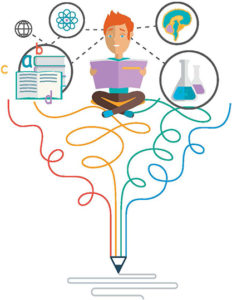Study Skills for Thriving with ADHD
Carey A. Heller, PsyD
Attention Magazine October 2021
Download PDF
 Whether or not they have ADHD, it is surprising how few students learn effective study skills in school. Part of this may stem from the fact that children learn differently, and study skills are not one-size-fits-all.
Whether or not they have ADHD, it is surprising how few students learn effective study skills in school. Part of this may stem from the fact that children learn differently, and study skills are not one-size-fits-all.
For children with ADHD, executing the act of sitting down and studying can be tough, because it is not inherently structured in the same way that doing specific math problems or completing a simple worksheet would be. This lack of structure may make it more difficult to get started with studying as well as to effectively carry out adequate preparation.
To help students better prepare for tests and exams, here are some general principles for developing and executing an effective study plan. You’ll find them especially helpful if your child or teen has ADHD.
Set up concrete tasks to complete each day leading up to an exam.
Write this out in a table as well as in a planner or daily to-do list. Then, quiz the student on key terms and definitions with flashcards. Breaking study and test preparation into tangible parts provides structure, a clear task and end goal, and the activity of studying each day is essentially turned into a small homework task.
Take a systematic approach toward studying.
I often find that conceptualizing the process of exam preparation into what has been termed the Three- Phase Approach (from There’s Really More to Studying Than Reviewing My Notes? 2016) is a useful way to think about studying:
- Phase 1: Gather study materials, make plan, general review, prepare study tools.
- Phase 2: Actively use material in a variety of ways USING NOTES (for example: answer practice questions, have someone quiz the student, have student teach the parent a lesson on the material). Using one’s notes during this phase is crucial, because it allows a person to relearn material more broadly and better understand concepts as well as how they fit together. It also prevents a child from focusing too much on memorization and studying material too narrowly.
- Phase 3: Actively use material in a variety of ways WITHOUT NOTES. This final phase should use the same types of tools as phase 2, but without notes. This should only be used once the student has a clear grasp of material and is confident in their knowledge. If short on time, it is better to use phase 2 longer and minimize phase 3 activities.
It is important that the student actively use the material in a variety of ways focusing on oral and written production (i.e., answer questions verbally, write down definitions).
Learning through verbalizing, hearing, seeing, and writing (that is, using a variety of senses) likely increases retention for most students. It allows them to learn information in a manner in which they can retrieve it efficiently and manipulate it even if the necessary material is presented or asked about in a different format on the actual exam.
Use practice questions in the same format as the exam.
This helps with practicing questions in a similar manner to how they may be presented on the test.
Be creative with study tools.
It is helpful for students to think outside the box and engage in activities to learn material that are of interest to them. For example, a child who is musically inclined could write a song using the material. A student who is artistic could draw pictures to represent information as relevant. The caveat to this: be sure that the child is not devoting too much extra time to the creative part, which may take away time necessary for directly using the material.
Specifically for students with ADHD
There are some study tools that individuals with ADHD often find helpful. Here are some examples; some will require parental assistance, and others will help foster the student’s independence.
- Use Quizlet or other online study tools. These options help facilitate independent study for many students. Using tools to set the number of times that one reviews material on these programs or uses a time limit can add in more structure.
- Answer practice questions in a variety of formats (multiple choice, matching, short answer, essay). Students can create their own questions to answer later, find practice questions online, or make sample questions with a friend and swap.
- The student can type or retype class notes to better organize them and add more detailed information.
- Type a list of key terms and definitions into a table.
- Save the original document. Then delete some terms and definitions to fill in to practice at a later time.
- Fold over the table and use it similarly to flashcards.
- Prepare a five-minute lesson on the material to teach a parent. Some students find preparing a Google Slides or PowerPoint presentation to be helpful for this. Some children find it useful to prepare a short quiz for their parents to take afterward. If the student can effectively teach the parent material that they do not know, it is likely that the child knows the material well enough at that point for their own exam.
- Use Inspiration Maps or other online programs to create diagrams with relevant information.
- Create timelines of key events, people, and so forth.
- For English books, prepare notes that list chapter or section summaries, key events, details about each main character, common themes, and so forth.
Exam preparation will vary based on the type of class, material, and how the student learns. Using these principles and tools as relevant will help your child, teen, or adult student study more effectively and thrive academically.
STUDY PLAN EXAMPLE
| History Exam- April 10 | Date to Work on Task | Estimated Completion Time or Time Limit |
| PHASE 1 | ||
| Enter key events and people into Quizlet. | April 1 | 30 minutes |
| Create sample multiple choice, fill-in-the blank, and essay questions. | April 2 | 45 minutes |
| PHASE 2: USE NOTES | ||
| Review Quizlet. | April 3 | 30 minutes |
| Parent quizzes student on key events and people. Put terms and definitions into a table after providing each answer orally. |
April 4 | 30 minutes |
| Answer practice questions. | April 5 | 1 hour |
| PHASE 3: NO NOTES | ||
| Review Quizlet. | April 6 | 20 minutes |
| Parent quizzes student on key events and people. Only write down answer when student gets it correct. | April 7 | 25 minutes |
| Answer practice questions. | April 8 | 30 minutes |
| Look over notes and use other study tools as needed to review material that the student still does not know as well. | April 9 | 45 minutes |
 Carey A. Heller, PsyD, is a licensed psychologist based in Maryland. He specializes in the evaluation and treatment of ADHD and executive function issues. Learn more at hellerpsychologygroup.com. The coordinator for the Montgomery County chapter of CHADD, Dr. Heller also serves as co-chair of the editorial advisory board for Attention magazine.
Carey A. Heller, PsyD, is a licensed psychologist based in Maryland. He specializes in the evaluation and treatment of ADHD and executive function issues. Learn more at hellerpsychologygroup.com. The coordinator for the Montgomery County chapter of CHADD, Dr. Heller also serves as co-chair of the editorial advisory board for Attention magazine.
Other Articles in this Edition
Resilience and ADHD During the Pandemic
Challenges in ADHD Care for Children of Color
PART ONE
Pay ADDention™! I’m a Teen Expert on ADD
Study Skills for Thriving with ADHD
Raph’s Tale, A Fable About Neurodiversity
Black Adults Who Live with ADHD
